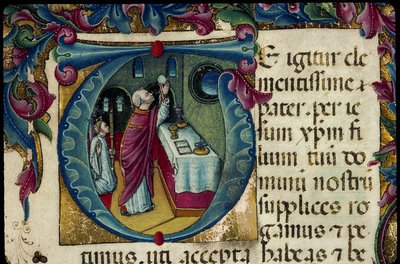
Bishop Trautman, of Erie, chairman of the Committee on the Liturgy of the United States Conference of Catholic Bishops, asks in the Jesuit weekly America:
Why have the new translations become so problematic, so non-pastoral? What is the basic difficulty?
May we venture a guess? We call to the stand Dom Prosper Guéranger:
Since the liturgical reform had for one of its principal aims the abolition of actions and formulas of mystical signification, it is a logical consequence that its authors had to vindicate the use of the vernacular in divine worship.
This is in the eyes of sectarians a most important item. 'Worship is no secret matter.' 'The people,' they say, 'must understand what they sing.'
Hatred for the Latin language is inborn in the hearts of all the enemies of Rome. They recognize it as the bond among Catholics throughout the universe, as the arsenal of orthodoxy against all the subtleties of the sectarian spirit. ...
The spirit of rebellion which drives them to confide the universal prayer to the language of each people, of each province, of each century, has for the rest produced its fruits, and the reformed themselves constantly perceive that the Catholic people, in spite of their Latin prayers, relish better and accomplish with more zeal the duties of the cult than most of the Protestant people. At every hour of the day, divine worship takes place in Catholic churches. The faithful Catholic who attends leaves his mother tongue at the door. Apart form the sermons, he hears nothing but mysterious words which, even so, are not heard in the most solemn moment of the Canon of the Mass. Nevertheless, this mystery charms him in such a way that he is not jealous of the lot of the Protestant, even though the ear of the latter doesn’t hear a single sound without perceiving its meaning.
While the reformed temple assembles, with great difficulty, purist Christians once a week, the 'Popish Church' watches unceasingly her numerous altars visited upon by her religious children; every day, they withdraw from their work to come hear those mysterious words which must be of God, for they nourish the faith and ease the pains.
We must admit it is a master blow of Protestantism to have declared war on the sacred language. If it should ever succeed in destroying it, it would be well on the way to victory. Exposed to profane gaze, like a virgin who has been violated, from that moment on the Liturgy has lost much of its sacred character, and very soon people find that it is not worthwhile putting aside one’s work or pleasure in order to go and listen to what is being spoken in the way one speaks on the town square. ...
The Anti-Liturgical Heresy
(L'Hérésie Anti-Liturgiste, an excerpt of the Institutions Liturgiques, v. 1)
________________________
(L'Hérésie Anti-Liturgiste, an excerpt of the Institutions Liturgiques, v. 1)
________________________
The Institutions Liturgiques, v. 1, were first published in 1840; Chapter 3 of Volume 2 of the same work includes a thorough presentation of the issue of liturgical language.